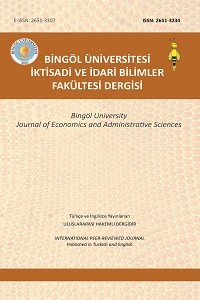Abstract
Seçmenler, oylarını kullanırlarken tüketiciler gibi mantıklı davranır ve bu davranıştan menfaatlerini maksimize etmeye çalışırlar. Afganistan demokrasiye ilişkin seçim tecrübelerini yeni yeni denerken, seçmenlerin davranışlarını anlamak çok önemli görünmektedir. Bu makale seçmen davranışlarını açığa çıkarmaya çalışıp bu davranışların rasyonel olup olmadığını Afganistan çapında sınamıştır. Bu çalışmanın asıl amacı iki karşıt yaklaşım olan mantıklı seçim ve etnik ve çatışma teorilerinin denemesidir. Bu amaçla online bir anket uygulaması gerçekleştirilerek 1016 gözleme ait veri toplanmıştır. Analizler STATA 14 ve EViews yazılımlarıyla yapılmıştır. Ampirik bulgulara göre, seçmen davranışları üzerinde, eğitim, dil ve etnik köken değişkenlerinin pozitif etkisi bulunmaktadır. Cinsiyet ve yaş değişkenlerinin seçmen davranışı üzerindeki etkisi ise istatistiki olarak anlamlı bulunmamıştır. Bu bulgular etnik ve çatışma teorisini doğrularken mantıklı davranış teorisini reddetmektedir. Bu bulguların 2019 yılı cumhurbaşkanlık seçimlerini de büyük oranda etkileyeceği öngörülmektedir.
References
- Antunes, R. (2010). Theoretical models of voting behaviour. Exedra, 145-170.
- Barfield, T. J. (2005). First Steps: The Afghan Elections. Current History, 104(680), 125-130.
- Downs, A. (1957). An Economic Theory of Political Action in a Democracy. Journal of Political Economy, 65(2), 135-150.
- Horowitz, D. L. (1985). Ethnic Groups in Conflict. California: University of California Press.
- IEC. (2016, July 07). Independent Election Commission of Afghanistan. Retrieved from Independent Election Commission of Afghanistan's Web site: http://www.iec.org.af/
- Keulder, C. (2010). Voting Behaviour in Namibia. State, Society and Democracy, 264-296.
- Ogu, M. I. (2013). Rational Choice Theory: Assumptions, Strenghts, and Greatest Weaknesses in Application Outside the Western Milieu Context . Arabian Journal of Business and Management.
- Petracca, P. (1991). The Rational Choice Approach to Politics: A Challenge to Democratic Theory . Review of Politics, 289-319.
- Wantchekon, L. (2003). Clientelism and Voting Behavior Evidence from a Field Experiment in Benin. World Politics, 399–422.
Abstract
Voters as customers behave rationally when they vote. They are trying to maximize their gains from this action. As Afghanistan is experiencing new era of democracy and elections, it’s very important to know the behavior of the voters. This article is trying to uncover the behaviors of the voters and the degree of this action’s rationality in Afghanistan’s context. The main purpose of the article is to test the rational choice and ethnicity and conflict theories as opposite arguments. An online survey has been conducted and a total of 1016 sample gathered. The analysis carried out in STATA 14 and EViews soft wares. The results show that the language, ethnicity and education have a statistically significant effect on voting behavior in Afghanistan. While the gender and age do not have any statistically significant effect on voting decision of Afghan voters which is consistent with ethnic and conflict theory and inconsistent with rational choice theory. This conclusion may be affecting the upcoming 2019 presidential elections in large scale.
References
- Antunes, R. (2010). Theoretical models of voting behaviour. Exedra, 145-170.
- Barfield, T. J. (2005). First Steps: The Afghan Elections. Current History, 104(680), 125-130.
- Downs, A. (1957). An Economic Theory of Political Action in a Democracy. Journal of Political Economy, 65(2), 135-150.
- Horowitz, D. L. (1985). Ethnic Groups in Conflict. California: University of California Press.
- IEC. (2016, July 07). Independent Election Commission of Afghanistan. Retrieved from Independent Election Commission of Afghanistan's Web site: http://www.iec.org.af/
- Keulder, C. (2010). Voting Behaviour in Namibia. State, Society and Democracy, 264-296.
- Ogu, M. I. (2013). Rational Choice Theory: Assumptions, Strenghts, and Greatest Weaknesses in Application Outside the Western Milieu Context . Arabian Journal of Business and Management.
- Petracca, P. (1991). The Rational Choice Approach to Politics: A Challenge to Democratic Theory . Review of Politics, 289-319.
- Wantchekon, L. (2003). Clientelism and Voting Behavior Evidence from a Field Experiment in Benin. World Politics, 399–422.
Details
| Primary Language | English |
|---|---|
| Journal Section | Makaleler |
| Authors | |
| Publication Date | August 30, 2019 |
| Submission Date | January 1, 2019 |
| Published in Issue | Year 2019 Volume: 3 Issue: 1 |



